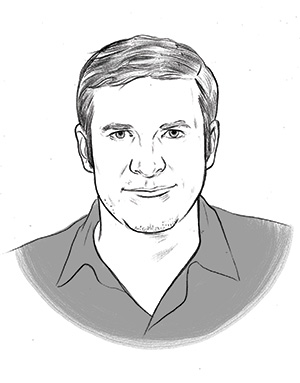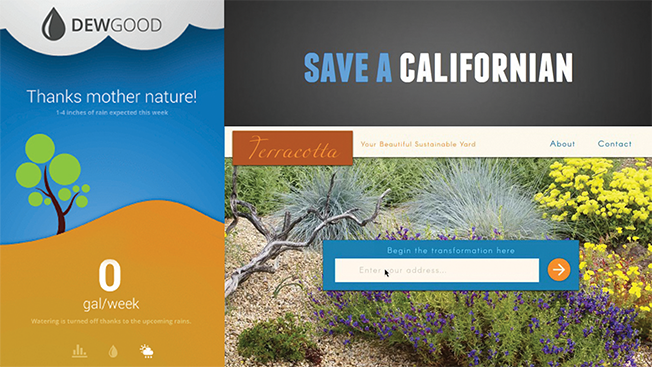Inspiration meets innovation at Brandweek, the ultimate marketing experience. Join industry luminaries, rising talent and strategic experts in Phoenix, Arizona this September 23–26 to assess challenges, develop solutions and create new pathways for growth. Register early to save.
The advertising and marketing community is home to some of the most imaginative minds in business. We use creativity to solve problems every day. So we decided that it was time to use that brainpower to solve an important issue facing every Californian.
In June, our invention team here at Deutsch, in partnership with USC, Hack for L.A., Global Shapers and the City of Los Angeles, put on the city's first Futurethon—Saving Water—a 48-hour hackathon aimed at inventing solutions to hack the California drought. Saving Water was one of four tracks in L.A.'s National Civic Hacking Weekend event.

Winston Binch
The turnout was impressive. The 500-person venue was standing room only and included everyone from students, teachers and farmers to advertising and technology professionals. Ages ranged from 13 to 73, and the buzz was palpable.
Mayor Eric Garcetti kicked off the day with an impassioned speech about the importance of innovation and the future of L.A. as well as the need for greater water conservation and new engineering solutions.
Our track included 60 people and 14 teams made up of students from USC and other local schools as well as professionals from Deutsch, Tiny Rebellion, TBWA\Chiat\Day and others.
The challenge for the teams was to devise tech or marketing solutions that would do one of three things: help reduce water consumption, increase water recycling practices, or keep water consumption habits top of mind.
First prize went to a clever campaign, "Save a Californian," which humorously pushed against the perception that Californians actually care more about themselves than the drought by asking the public to save people like Kim Kardashian because "she's shallow" just like California. Intended to raise drought awareness, the campaign included a donation component that would put thousands of gallons of water back into the Colorado River through a partnership with nonprofit Change the Course.
The runner-up prize went to DewGood, an outdoor water condenser disguised as a solar-powered garden lamp. The lamp lowers air temperature, collects dew and waters plants in a 10- by 10-foot area. The team brought a 3-D printer to the event and built a working prototype.
The winning student idea—and USC summer fellowship—went to the team behind TerraCotta, a Web app that helps people design beautiful and sustainable landscaping solutions. L.A. has an unfortunate obsession with water-intensive landscape design. This idea seeks to give people more environmentally friendly and creative options while educating them in the process.
My personal takeaway from the event was simply make more room for social good. I was blown away by the energy and passion our people put into the event. They gave up entire weekends to make it happen, and participation was incredible. We had four mentors, 10 participants and another six help with branding, program planning and marketing.
It was a great reminder of the importance of doing things that fuel your employees' passions around social good. According to the 2014 Millennial Impact Report, 55 percent of millennials choose a job because of the causes the company is connected to. Doing good is an important employee motivation and retention play. You'll see us doing more for causes our people care about. Causal is the new creativity.
So blow up the creative department. Seriously, the best ideas are the result of divergent thinking. You get there more often by forming small teams of diverse creative makers and thinkers. The hackathon again confirmed this for me. The two winning teams were not traditional in configuration. They included strategists, engineers, designers, writers, producers and account people, and more closely resembled a tech startup than a creative agency.
Invite design and engineering to the table. Treat creativity like music and adopt a jam mentality.
The future isn't being written, it's being coded and moving fast. Sure, craft matters, but speed kills. I was impressed by the pace of the teams. All of the ideas need fit and finish, but the quality was better than expected—a reminder that creativity needs constraints.
We have a tendency to over-intellectualize problems, and things generally take too long. Agencies need to use intuition more and work faster. Much of what we do is about connecting emotionally with people. And with social listening tools and platforms like Facebook, it's easy to get to quality insights quickly. We need to take notes from tech-centered companies and better operationalize fast creative. For context, BuzzFeed makes 65 videos a week. Not every one's a hit, particularly the branded stuff. But they routinely get a million-plus views. Be prolific, not precious.
And then there is strategy. Good, quick design work went into Save a Californian, but it won because of the strategy. It was built around a funny and revealing insight about Californians and the drought. The strategic idea is everything. Creative work is only an expression of it. If you don't have a strategy built on a truth that challenges conventional thinking, odds are that no one will pay attention.
The winning team bought into this approach, and it showed. The lesson here is get to a strategic idea that earns attention by sparking an immediate emotional response. Save a Californian got the attention of the judges by playing off of California's vanity in a charming way.
The Saving Water event is not going to end the drought in California, but the teams got to actionable ideas and their thinking will make a difference. The winning team is in talks with Change the Course to bring the idea to life, the student concept is being incubated at USC, and we will continue to put resources against the cause.
Beyond the community benefit, the event gave our people the opportunity to work on something they're passionate about and to make things. It also taught me what they can do when we turn them loose on a problem and get out of the way.
I'm grateful I get to work with them every day and appreciate their efforts to combat an issue much bigger than advertising. Hack the way you work and find opportunities to use your creativity for good. It's great for the soul and your business.
Winston Binch (@winstonbinch) is Chief Digital Officer of Deutsch North America.
This story first appeared in the Aug. 31 issue of Adweek magazine. Click here to subscribe.








